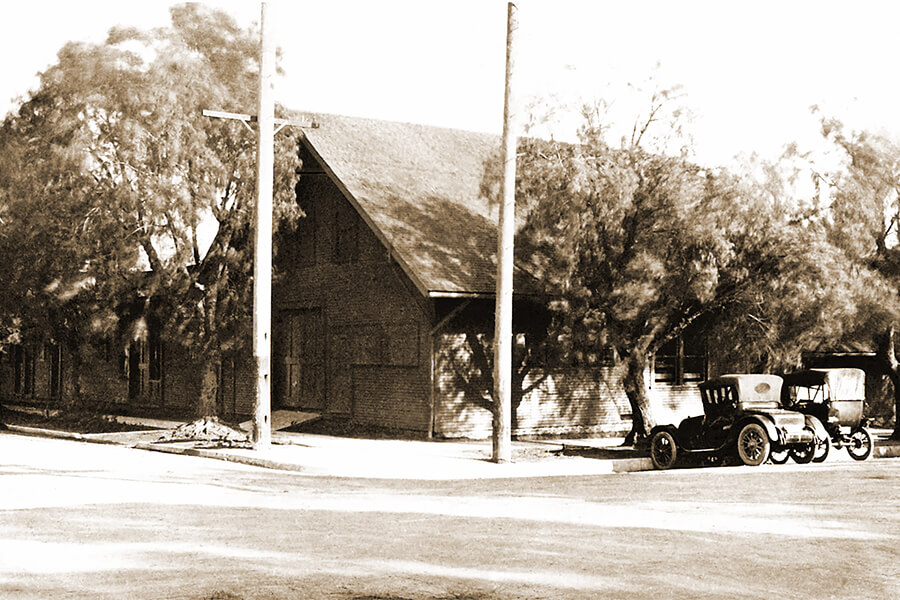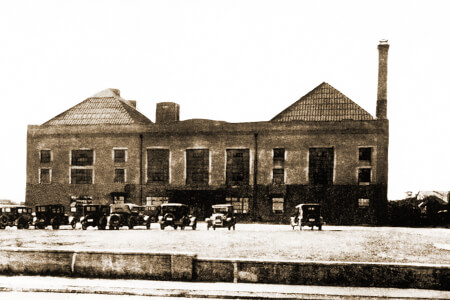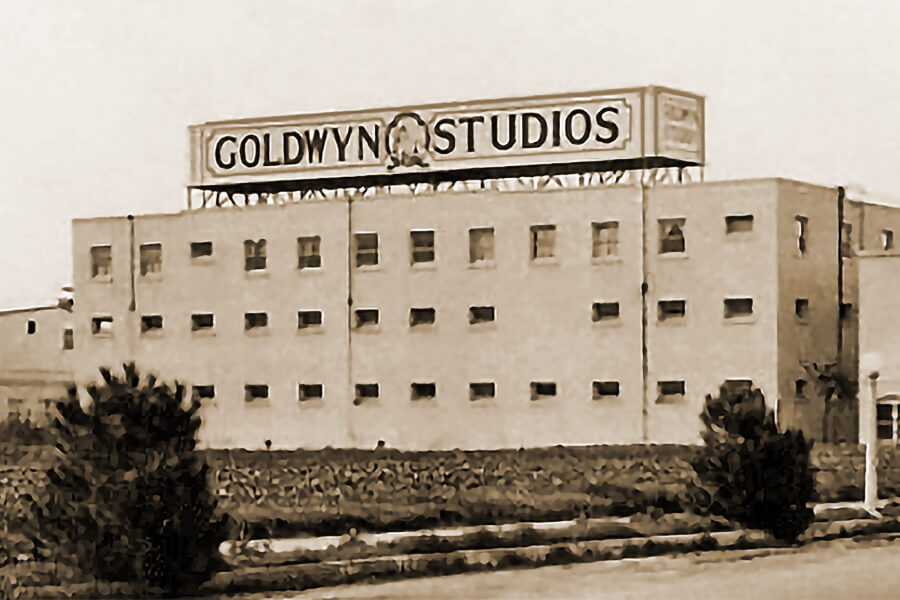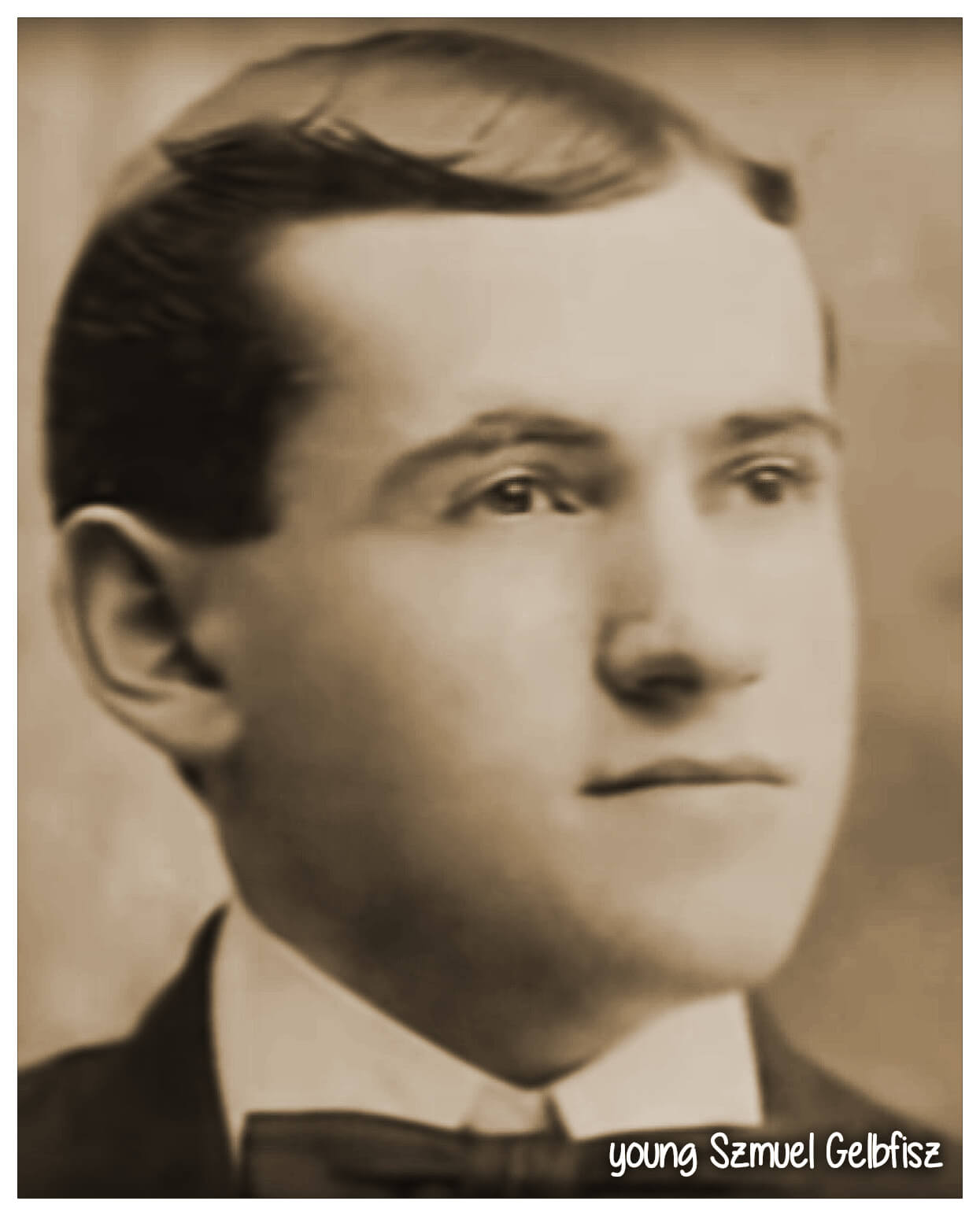Sam Goldwyn's studios
(Click their box to read about them)
Goldwyn Studio/UA
West Hollywood
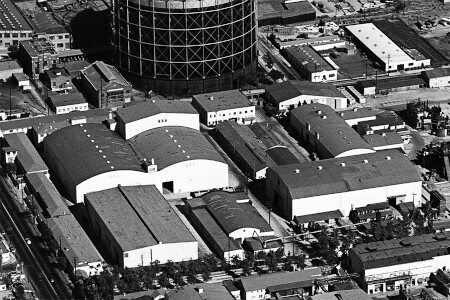
Santa Monica Blvd. at Formosa St.
xxxx-xxxx
Hollywood's Greatest Independent Producer
Samuel Goldwyn
"I'm willing to admit that I may not
always be right, but I am never wrong."
(click to enlarge)
1879-1974
Related Pages:
What's in a Name?
Samuel Goldwyn was not always Samuel Goldwyn. He was Samuel Goldfish. But even before he was Samuel Goldfish, he was Szmuel Gelbfisz and was born in Warsaw, Poland August 17, 1879, and lived to the ripe old age of 94.
A kind man, Goldwyn was known for his humanitarianism and his community involvement. He was known for his honesty and integrity, but also for being a general irritant and a pest and nuisance for always wanting his way. "Goldwyn is Boss" became a saying. Whether he was Goldfish or Goldwyn, he did not play nicely with others.
His lack of grasp of the English language, his confusion of nouns, verbs, and adjectives, his flopping of tenses and rearrangements of phrases became legendary. He developed his own version of the language known as "Goldwynisms."
Samuel Goldwyn was considered by most Hollywood historians as the industry's greatest early independent producer, and the owner or partner in several movie studios and companies, including owning the forerunner company to the ionic MGM. MGM's iconic Leo the Lion logo originally belonged to Goldwyn Pictures and was the invention of one Samuel Goldfish. Later he became a partner in United Artists and took over the large United Artists Studios.
To those inside the industry, he was known as a ruthless salesman, an arm-twister, a fierce individualist always wanting it his way. Outside the business, he was known as a humanitarian and civic leader.
His grasp of "film as art" was also legendary. He always wanted to produce "quality" pictures (as a glove maker he would only make "quality" gloves) and was a big force behind taking the movies beyond the typical cowboy and Indian "shoot-'em-up" adventures that the industry was based on. In 1913 he was an advocate for feature-length films and was one of the pioneers in making them the standard. In 1919 he became a strong advocate for the focus on the writer and the scenario (script), hiring the best writers and elevating film expression. His goal was always to produce the best.
He also was a hands-on producer, needing to be in charge of every detail of a film, from casting of the smallest parts to picking out the buttons on the coats the characters wore. Sometimes he preferred perfection over profit...his own unique version of perfection. "The characters are consistent; the workmanship is honest; there are no tricks and short cuts; the intelligence of the audience is never insulted," says Goldwyn biographer, Alva Johnston.
Samual Goldfish, the glove maker.
Goldwyn did not start his adulthood as a movie producer but as a glove maker and glove salesman. Shortly after his father's death in 1894, Szmuel Gelbfisz made his way to Germany where he learned the glove trade and changed his name to the more westernized Samuel Goldfish. In 1899 Sam emigrated to the United States, landing in Gloversville, New York where the country's glove trade was centered. His salesmanship led him to the position of Vice President of the Elite Glove Company.
Sam Goldwyn
and his Goldwynisms
Before Yogi Berra uttered his first Yogi-ism, Samuel Goldwyn became famous for his Goldwynisms. Most of them just leave you scratching your head, while others kind of make sense, if you squint real hard. Here are his top 10:
"If I look confused it is because I am thinking."
"When I want your opinion, I will give it to you."
"The harder I work, the luckier I get."
"A verbal contract isn't worth the paper it's written on."
"Include me out."
"Any man who goes to a psychiatrist ought to have his head examined."
"It's absolutely impossible, but it has possibilities."
"A hospital is no place to be sick."
"I don't think anyone should write their autobiography until after they're dead."
"If I could drop dead right now, I'd be the happiest man alive."
 In 1910 Sam Goldfish move to New York City and married Blanche Lasky, (who divorced him in 1915). Though the marriage only lasted a very few years, he did find himself the brother-in-law of Jesse L. Lasky, a theatrical impresario and vaudeville producer. Lasky toyed with the idea of making movies, urged by attorney Arthur Friend. But the timing was not right. Lasky had just lost $100,000 in a new venture, the Folies-Bergere theater-restaurant in New York. It made him resistant. He wanted to stick to vaudeville, something he knew. Friend then presented the idea to Goldfish but Sam had plans for starting a new glove business.
In 1910 Sam Goldfish move to New York City and married Blanche Lasky, (who divorced him in 1915). Though the marriage only lasted a very few years, he did find himself the brother-in-law of Jesse L. Lasky, a theatrical impresario and vaudeville producer. Lasky toyed with the idea of making movies, urged by attorney Arthur Friend. But the timing was not right. Lasky had just lost $100,000 in a new venture, the Folies-Bergere theater-restaurant in New York. It made him resistant. He wanted to stick to vaudeville, something he knew. Friend then presented the idea to Goldfish but Sam had plans for starting a new glove business.
A year later, however, Sam Goldfish was ready. The new business was struggling. He approached Lasky with the idea, who, after being constantly pestered by Goldfish, agreed. But the stipulations were that the company had to bear Lasky's name, and he didn't want to be involved in the day-to-day activities. So, in 1912 Goldfish, Lasky, and Arthur Friend started the Jesse L. Lasky Feature Play Company, with about $25,000 in their pockets. But none of the trio knew anything about movie-making. Attempts to hire experienced people failed, including the legendary D.W. Griffith, who demanded a quarter-million dollars.
So the fledgling company hired struggling playwright Cecil B. DeMille. Even though DeMille lacked the movie experience, he showed enthusiasm and was offered a partnership in the new venture.
After a brief stop in Arizona, DeMille led the new company to Hollywood, while Goldfish and Lasky stayed in New York. Goldfish donned the mantle of company manager while DeMille, the newly minted "director-general," rented an old barn and produced and directed Hollywood's first feature-length film, The Squaw Man starring stage legend Destin Farnum. The movie was a huge success, and the company was on its way.
Samuel Goldfish liked being the man in charge. He relished the control. He craved it. From childhood, he had been the controlling force in everything he did. He left home at age 15 so he could better control his life. Not content working for a boss in the glove business, he had started his own glove company so he could be in control. He loved control. So it was natural for Samuel Goldfish to take control of the Lasky company.
The success of The Squaw Man spurred the little company on. It made millions and led to success for the next feature, Bruster's Millions. Jesse Lasky was liking this movie business and wanted to be more involved in the firm that bore his name and was taking control from Goldfish. Sam Goldfish began to feel squeezed.
Even before becoming Samuel Goldwyn, this was what he lived by. If he didn't get his way, he whined and complained until everyone else capitulated. He demanded control and loyalty.
Goldfish was beginning to irritate both Lasky and DeMille. They plotted together to have him removed from the company. Arthur Friend agreed and Goldfish was voted out, but he pestered the partners and talked his way back in...his salesmanship and whining prevailed. And though he was not the decision-maker, he wielded considerable influence.
The Lasky Company had produced a nice string of success and the little barn at the corner of Selma and Vine Streets in Hollywood began to take on a life of its own. Steadily over the next three years, the company and the studio grew until it burst at its seams.
By 1916 was considered one of the premier production companies in the movie business, with one of the biggest and best movie studios. Its biggest competitor was Adolph Zukor's Famous Players Film Co. Lasky and DeMille found themselves competing for the same theaters, the same actors, and the same scripts, often outbidding one another in the effort to outdo the other. So, on June 28th of that year, they agreed to combine forces and merge. Using Zudor's formidable business skills, and Lasky's large studio, the combined forces into the biggest and best in the business at the time.
Samual Goldfish, on the other hand, began to find himself as the odd-man-out. Not liked by any of the partners, and being a particular irritant to Adolph Zukor, it was clear that there wasn't room for two headstrong businessmen.
The partners met behind his back to decide the fate of the company. Zukor wanted him out, and DeMille wanted him to stay. It was his own brother-in-law, Jesse Lasky, who cast the deciding vote. Samuel Goldfish was out of the company he created.
Samuel Goldfish was made an offer he could not refuse for his shares in Famous Players-Lasky Corporation and kicked to the curb. But he left with a million dollars in his pocket and the need to start a new business and keep making movies.
Sam Goldfish had already established himself and his reputation as a producer positioned him to begin attracting talent. He made a decision that he would make fewer but better films and thought a great way to set about it would be to partner with someone with connections to the legitimate theater, where he could acquire scripts and actors. He approached two young producers, Edgar and Archibald Selwyn. Initially, the brothers declined Goldfish's offers for a partnership, but, as Sam being Sam, pestered them until they finally (and reluctantly) agreed and on November 19, 1916, Goldwyn Pictures Corp. was formed, taking the best from each of their names, even though many thought it should have been called "Selfish Pictures" instead.
The company logo, the reclining lion, was "stolen" from the New York Public Library, which was right across the street from Goldwyn Pictures offices. Some version of it has been in use right up until today.
Goldwyn Pictures moves into Fort Lee
Sam Goldfish's goal for the Goldwyn Company was to make great pictures. Using famous plays and famous actors, grand sets, and plenty of action. What he would call "Goldwyn Epics."
In January 1917 offices were set up in New York, and the small, vacant Solax Studio in Fort Lee was rented. It had just a single enclosed stage, but plenty of room for dressing rooms, cutting rooms, and outdoor space. Production began in earnest, the first company produced film was Polly of the Circus starring Goldwyn's new star, Mae Marsh.
By April production was at such a fast pace that the company needed more space, so a lease was taken out on Fort Lee's largest studio, "The Universal" Main Street, which had two large enclosed stages, a smaller enclosed stage, and a large backlot. Polly was moved to the new, larger plant. The goal for the company was to produce 10 films by September, and Goldwyn Pictures begin releasing them. That would give them plenty of time to interest exhibitors and presell as much as possible with a big rollout in the fall.
Goldfish-Goldwyn. What's in a name?
Samuel Goldfish became tired of being the butt of "goldfish" jokes. It seems he didn't become aware that there was anything odd about his name until he went out on his own. The moment he entered the partnership with the Selwyn brothers, the jokes became commonplace in theNew York theater, in addition to Paramount and Famous Players-Lasky. It didn't take long for him to make a big change.
So, in 1918 he had his attorney petition the courts for a permanent name change. He was no longer Samuel Goldfish. He was Samuel Goldwyn, swiping the name of the company and the back half of the Selwyns' name...and the Selwyns were furious, but could do nothing about it.
Sam Goldwyn became one of the most prominent names in the business, and a serious competitor to the major studios, and stayed that way for another half-century.
The company expands again...
In March of 1918 The Goldwyn company leased a pair of studios in New York City and in October they built new stages at the Universal plant. They were simply outgrowing the available facilities on the East Coast.
Now a couple of wrenches in the works. First, the cost of coal-fired electricity was getting too high to be practical. The government had put quotas on electricity usage, so shooting in Fort Lee and New York became unpredictable. Second, the box office failure of several films, he spent too much money on star contracts. Third, the war had drastically reduced attendance at theaters (this was epidemic among many of the early studios, who went out of business during this period).
So the decision was made. He started looking around for new investors and set about to find less expensive studio facilities. He sent representatives to California, where his competitors had already set up shop and were enjoying shooting in the free sunshine that Hollywood gave them most of the year.
...and finally moves to the West Coast.
After the three points of the struggling Triangle Company left the fold (Ince, Griffith, and Sennett), they were forced to give up their Culver City and East Hollywood studios and retrench back to New York. The Culver City studio was the biggest and most modern in the industry. Sam Goldfish and the Goldwyn Company took out a lease on the studio on Nov. 1, 1918, paid off all his East Coast debts, met the payroll, laid off his local employees, and moved production west, where he could get a fresh start. In June of 1919, flush with money from several new investors, including the Shuberts of theatrical fame, Goldwyn Pictures was able to pick up the Triangle studio for pennies on the dollar. Additionally, this merger brought into the fold the theaters controlled by the Shuberts, Goldwyn never had theaters like most of their big competitors. The du Ponts also invested in Goldwyn Pictures. Money was now no problem for the company.
1919 was also eventful for Sam in another way. To the chagrin of his partners, the Selwyns, he changed his last name to the name of the company. He was now Samuel Goldwyn. Even though Edgar and Archie Selwyn protested the usurping of their last name, there was nothing they could do. In a major coup, Samuel Goldfish would forever be known as Samuel Goldwyn and he would make sure the name was always famous and well known.
Sam gets the boot...again.
It happened this way: Sam Goldwyn would push and push and push people until they caved and he got his way. A good trait for a glove salesman, but not good for interpersonal relationships. Most people found him irritating, including one of the company Vice Presidents,
Was Samuel Goldwyn invited
to partner in MGM?
I do not know if this is fact or legend, but, according to Goldwyn himself, it goes something like this:
Marcus Loew and Nicholas Schenk, owners of Metro-Goldwyn-Mayer , thought they needed another major producer with skill and star power. So, in 1925 they approached Samuel Goldwyn to partner with M-G-M and add his considerable abilities and reputation for the gravitas he would bring.
Goldwyn thought that was a fine idea. He had only one stipulation. He was not a part of Goldwyn Pictures when it was merged into Metro. So he demanded a change in the company's name. If he were to partner, the name would have to be changed to Metro-Goldwyn-Mayer and Goldwyn.
The merger never materialized.
Frank Joseph Godsol, who went by Joe. Godsol had talked his way into the company, in a very Goldwyn-ish way, by promising that Goldwyn could absorb Godsol's chain of theaters and would have access to his $5 million lines of credit with the DuPont family. Godsol became vice president of the company. A good move on his part.
Godsol was known as a good-natured son-of-a-bitch. So, one could assume he and Goldwyn would butt heads.
It was 1921. In a most humiliating move, Joe Godsol got Sam Goldwyn removed from board of the company he founded. It was the second time this happened, the first was his unceremonious removal from Famous Players-Lasky Company. He would not put himself in that position again.
The pushy Goldwyn found new investors, allies that would get him re-elected to the board with considerable power and clout. But...as Goldwyn did he alienated those forces, as well.
Goldwyn and Godsol fought on nearly every topic, to the point where Godsol vowed to dump Goldwyn and take over the company. In 1923 he succeeded, persuading the majority of the stockholders to vote him out of the Presidency and remove him from the board and from the company altogether.
Sam was out. But Sam was not done. He would start a new company, Samuel Goldwyn Productions, and was forever the sole owner, doing exactly as he pleased. He reigned as Hollywood's top independent producer for half a century, long after Godsol, the Selwyns, and his other former partners were long forgotten.

1924 set up shop at United Studios on Melrose (later bought by Paramount-Famous-Lasky.
1928 bought into U.A. and moved his operation to Santa Monica Blvd.
Samuel Goldwyn, Inc.
"He steals an idea, then believes he thought of it himself."
"Samuel Goldwyn Presents" "The Goldwyn Touch."
Fewer, better. Self-financed. "First Class pictures." William Wyler
Married Frances Howard in 1925. A marriage of convenience for each, Frances needed the security of a marriage while Sam was trying to bleach the Jewishness out of himself by marrying a good Catholic girl. Never got over the fear of losing everything. Whether Sam was gambling on a picture of playing poker with his buddies.
Hired best talent, producers, directors, writers.
Just as he was gaining stability in the industry, a new technology threw a new wrench into the works. Sound.
First sound film, Bulldog Drummond starring Ronald Coleman made more than all his silent movies combined.
Eddie Cantor
William Wyler
John Ford
King Vidor
Joel McCrea
Lillian Hellman
Merle Oberon
Danny Kaye
Lucille Ball
Greg Toland
Laurence Olivier
Alfred Newman
Goldwyn Girls.
Gary Cooper
Teresa Wright
Cary Grant
Loretta Young
Dana Andrews
Myrna Loy
Fredrich March
Farley Grainger
Brando
Dorothy Dandridge
Sidney Portier
Bob Hope
imdb: "Produced eight Oscar Best Picture nominees: Arrowsmith (1931), Dodsworth (1936), Dead End (1937), Wuthering Heights (1939), The Little Foxes (1941), The Pride of the Yankees (1942), The Best Years of Our Lives (1946) and The Bishop's Wife (1947). "The Best Years of Our Lives? is the only winner in the category." 8 nominations, 7 wins plus 2 honorary awards.
Dodsworth, Children's Hour, The Hurricane, Dead End, Stella Dallas.,Stella Dallas again, Wuthering Heights, Little Foxes, Best Years of our Lives, Pride of the Yankees, the secret life of Walter mitty, bishops wife Hans Christian Anderson guys and dolls porgy and bess
Always looking for the next star that the other producers had progy...the idealized woman to replace his mother. Unattainable woman.
Got financing help from C.B. DeMille who was on board of B of A and secured 250k loan on the strength of his ability instead of assets.
Anna Sten-Goldwyn's Folly.
"Terrible temper often left everyone running in fear or frustration." documentary
Stole the studio, unilaterally renaming it Samuel Goldwyn Studios.
Nobody dictated terms to Goldwyn
Best Pic and Tbalberg awards the same year
July 2, 1958 fire destroyed stage 8.
January 31, 1974, 2:00 am died of old age.
Gentleman, uncultured charming gentle semi-literate, clever.

